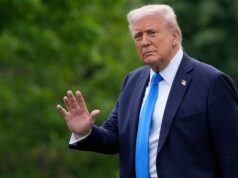Philippines considering trilateral defence pact with U.S. and Japan

By Gabriel Dominguez
After signing separate defence deals with the United States and Japan, the Philippines is now also reviewing a proposed tripartite security pact with these countries amid tensions with China and concerns it could be pulled into a Taiwan conflict.
Philippine President Ferdinand Marcos Jr. told Kyodo News that the proposal was discussed with Prime Minister Fumio Kishida during his five-day visit to Tokyo, which ended Sunday.
He said such a pact could be “a central element to … providing some sort of stability in the face of all these problems that we are seeing around us,” adding that it would also help strengthen trilateral ties in “confusing” and “dangerous” situations both in the Asia-Pacific region and beyond.
However, the Philippine leader stressed that the proposal is still at the conceptual stage.
“We don’t really have details yet,” Marcos said separately to local media.
“We have to talk to the Americans also to see what roles are really going to be played should there be a tripartite agreement,” he said, adding that, “maybe sometime down the road, we will sit down with our Japanese counterparts and American counterparts and we’ll see what is it really that they want.”
When asked for comment on the proposal, Chief Cabinet Secretary Hirokazu Matsuno on Monday did not confirm whether a tripartite agreement was discussed during Marcos’ meeting with Kishida, saying only that the two leaders agreed to continue strengthening trilateral security cooperation with Washington.
Marcos’ remarks come a little over a week after Manila granted Washington access to an additional four military sites in the Philippines, a move that was followed Thursday by several defence cooperation deals between Tokyo and Manila.
One of the agreements involves streamlining visiting procedures for the Self-Defence Forces when conducting humanitarian assistance and disaster relief drills in the Philippines. The move is viewed as a precursor to a broader visiting forces agreement that would allow the SDF to deploy more easily to the Philippines for a range of military activities, enabling more robust bilateral and trilateral coordination.
Marcos told reporters Sunday that he sees no reason why his government shouldn’t sign such a visiting forces agreement with Japan if it helps protect Philippine fishers and maritime territory.
At the same time, he raised the need to be careful, “because we do not want to appear provocative.” Unlike his predecessor, Rodrigo Duterte, Marcos has pledged to take a firm stance against any Chinese threats to Philippine claims in the South China Sea. At the same time, Marcos is aware that having rotating U.S. and Japanese troops in his country could serve another purpose: deterring China from invading Taiwan.
The Philippines’ proximity to the self-ruled island makes it, alongside American bases in Japan, an attractive staging point for U.S. intervention. This is why reinforcing defence relations with Manila has become a critical element in both Tokyo and Washington’s plans to counter Beijing.
It is unclear what role Japan would play in a Taiwan conflict, but there are indications that Tokyo is preparing for such a contingency. That said, given the legal constraints on the SDF, Japan’s role in such a scenario may be limited to defending its own territory and the U.S. bases there, rather than actively dispatching combatants to Taiwan or surrounding areas.
The extent to which Manila has thought about its own role in a potential Taiwan contingency is not yet clear, but during his Japan trip Marcos said he is aware that his country could be pulled into such a conflict.
“We can see that just by our geographical location, should there in fact be conflict in that area … it’s very hard to imagine a scenario where the Philippines will not somehow get involved,” he told the Nikkei daily.
Experts at the Washington-based Center for Strategic and International Studies argue that while some groups within each country, especially the Philippines, will likely urge neutrality, the political, strategic and geographic realities mean that the Philippines and Japan “will likely find themselves drawn into such a crisis.”
“The Philippines has spent the least time planning for that eventuality and needs to build up its political, economic, and military readiness if it is to coordinate effectively in an allied response,” the experts said in a recently published analysis.
So, how would a trilateral defence agreement help? With very few details made public, it’s difficult to assess the degree of trilateral cooperation envisaged. However, experts point out that such a framework would likely allow for both greater coordination, including on how to address activities by China’s coast guard and maritime militia vessels, and deeper integration of military capabilities.
This could include more joint military drills, greater intelligence-sharing, additional U.S.-Japan support for Manila in terms of military equipment and technology, increased interoperability through the use of similar equipment, more surveillance and reconnaissance cooperation in the South China Sea, and perhaps even integration of command structures.
“In general, such a trilateral framework would critically expand the scope of military deployments in the region, through more efficient logistical support and command structures,” said Sebastian Maslow, a Japanese security expert and lecturer at Sendai Shirayuri Women’s College.
“It would also include a focus on the Indo-Pacific as the common denominator for security cooperation.” The move, he said, can be viewed as part of the evolving network of smaller security and defence partnerships in the region — such as “the Quad” and AUKUS — to enhance and integrate capabilities to counter China’s growing influence.
Nonetheless, analysts noted that the proposed trilateral defence agreement is likely to also have its limitations.
“Washington is looking to reach a lock-in agreement with Manila at this time, knowing that the next administration could again lean back in China’s direction,” said James D.J. Brown, an associate professor of political science at Temple University Japan.
However, he warned, “a genuine trilateral alliance is not on the cards.” To start with, Japan is not legally in a position to commit to defending the territory of either partner, he said.
Additionally, while Marcos is willing to enhance security cooperation with Washington, he, like the leaders of most Southeast Asian countries, does not want to be forced to choose sides in a “U.S.-China Cold War,” Brown added.
Source : Japan Times




